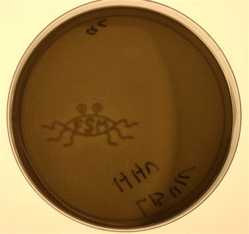
Bacteria show Intelligent Design by the Flying Spaghetti Monster
The notorious E. coli bug made its film debut Wednesday. That’s when researchers at the University of California, San Francisco and the University of Texas announced in the journal Nature that they had created photographs of themselves by programming the bacteria – best known for outbreaks of food poisoning – to make pictures in much the same way Kodak film produces images.
It’s the latest advance in “synthetic biology,” a disputed research movement launched largely by engineers and chemists bent on genetically manipulating microscopic bugs into acting like tiny machines, creating new, powerful and inexpensive ways to make drugs, plastics and even alternatives to fossil fuel.
The field seeks to go beyond traditional genetic engineering feats where a single gene is spliced into bacteria and other cells to manufacture drugs. Synthetic biologists are trying to create complex systems that function as logically and reliably as computers.
I’m really tired of self-described “ethicists” ready to halt any and every kind of scientific research on the premise that it might be used by terrorists. Labeling everything from dissent to basic research as “dangerous” must be a genetic trait of the intellectually dishonest.














